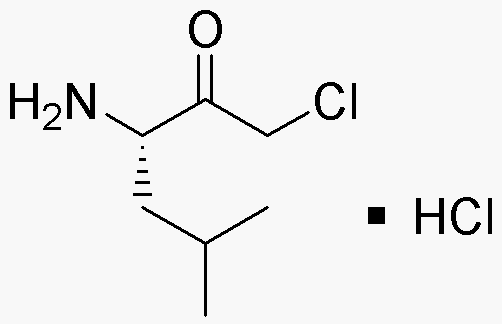L-Leucine chloromethyl ketone hydrochloride is widely utilized in research focused on:
- Protein Synthesis Inhibition: This compound is often used to study protein synthesis by inhibiting specific pathways, making it valuable for researchers investigating muscle metabolism and growth.
- Pharmaceutical Development: It serves as a building block in the synthesis of various pharmaceuticals, particularly in the development of drugs targeting metabolic disorders.
- Biochemical Research: The compound is used in biochemical assays to explore enzyme activity and regulation, providing insights into metabolic pathways.
- Neuroscience Studies: It is applied in neurobiological research to understand the role of amino acids in neurotransmission and neuroprotection.
- Peptide Synthesis: L-Leucine chloromethyl ketone hydrochloride is utilized in the synthesis of peptides, enhancing the efficiency of producing therapeutic agents.
General Information
Properties
Safety and Regulations
Applications
L-Leucine chloromethyl ketone hydrochloride is widely utilized in research focused on:
- Protein Synthesis Inhibition: This compound is often used to study protein synthesis by inhibiting specific pathways, making it valuable for researchers investigating muscle metabolism and growth.
- Pharmaceutical Development: It serves as a building block in the synthesis of various pharmaceuticals, particularly in the development of drugs targeting metabolic disorders.
- Biochemical Research: The compound is used in biochemical assays to explore enzyme activity and regulation, providing insights into metabolic pathways.
- Neuroscience Studies: It is applied in neurobiological research to understand the role of amino acids in neurotransmission and neuroprotection.
- Peptide Synthesis: L-Leucine chloromethyl ketone hydrochloride is utilized in the synthesis of peptides, enhancing the efficiency of producing therapeutic agents.
Documents
Safety Data Sheets (SDS)
The SDS provides comprehensive safety information on handling, storage, and disposal of the product.
Product Specification (PS)
The PS provides a comprehensive breakdown of the product’s properties, including chemical composition, physical state, purity, and storage requirements. It also details acceptable quality ranges and the product's intended applications.
Certificates of Analysis (COA)
Search for Certificates of Analysis (COA) by entering the products Lot Number. Lot and Batch Numbers can be found on a product’s label following the words ‘Lot’ or ‘Batch’.
*Catalog Number
*Lot Number
Certificates Of Origin (COO)
This COO confirms the country where the product was manufactured, and also details the materials and components used in it and whether it is derived from natural, synthetic, or other specific sources. This certificate may be required for customs, trade, and regulatory compliance.
*Catalog Number
*Lot Number
Safety Data Sheets (SDS)
The SDS provides comprehensive safety information on handling, storage, and disposal of the product.
DownloadProduct Specification (PS)
The PS provides a comprehensive breakdown of the product’s properties, including chemical composition, physical state, purity, and storage requirements. It also details acceptable quality ranges and the product's intended applications.
DownloadCertificates of Analysis (COA)
Search for Certificates of Analysis (COA) by entering the products Lot Number. Lot and Batch Numbers can be found on a product’s label following the words ‘Lot’ or ‘Batch’.
*Catalog Number
*Lot Number
Certificates Of Origin (COO)
This COO confirms the country where the product was manufactured, and also details the materials and components used in it and whether it is derived from natural, synthetic, or other specific sources. This certificate may be required for customs, trade, and regulatory compliance.


